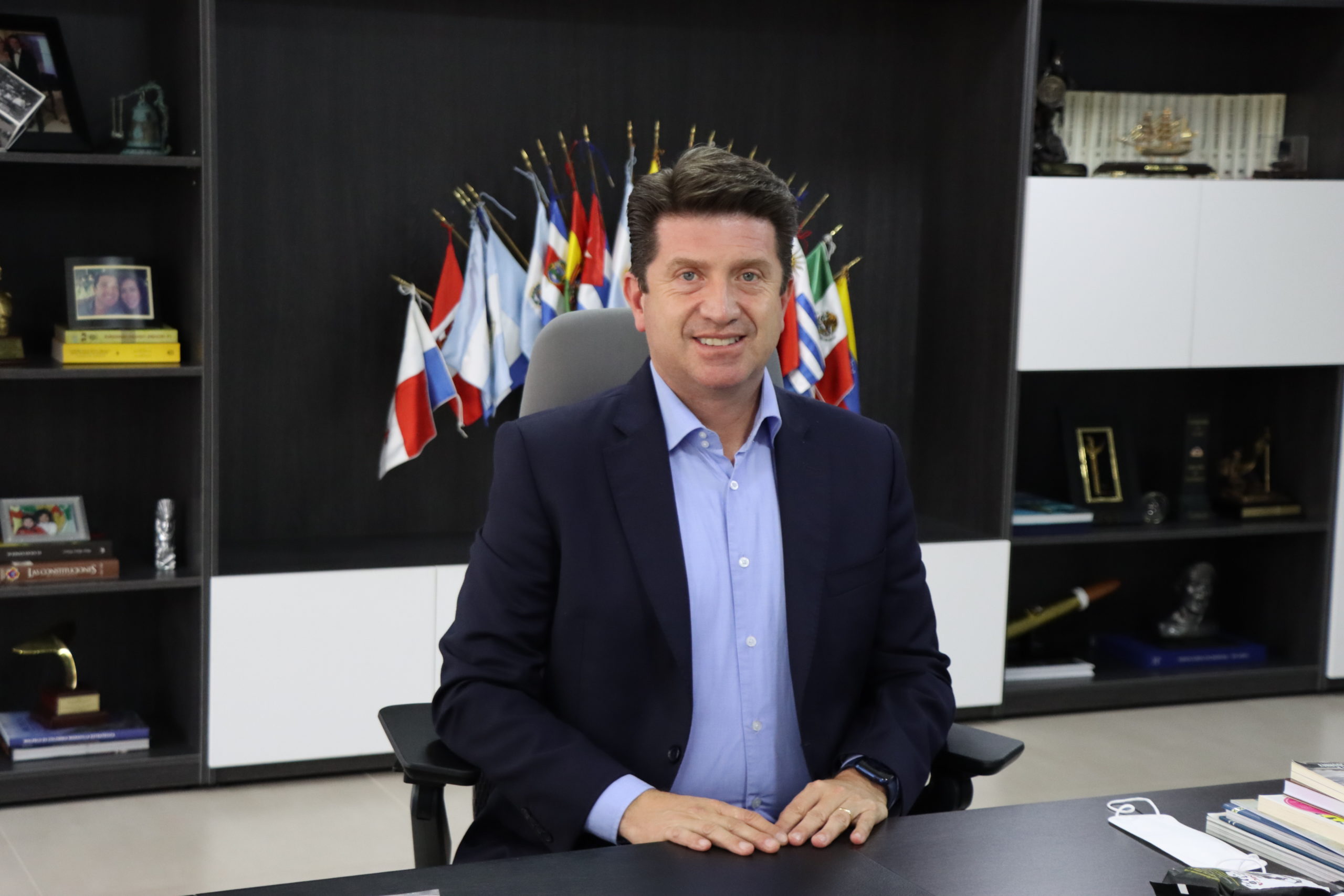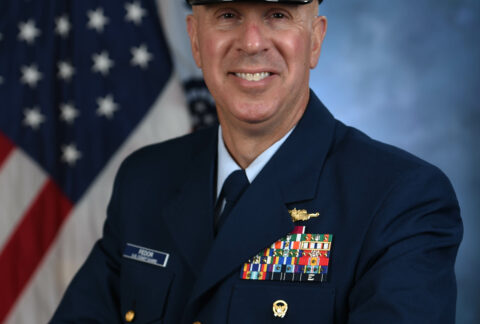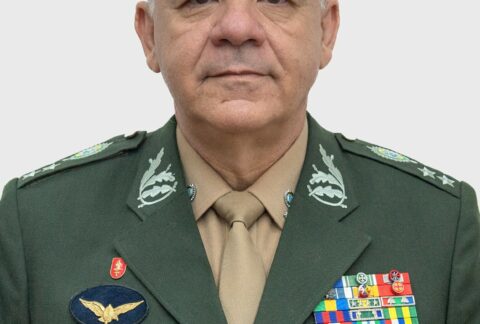Combating narcotrafficking chains, their leaders, and dismantling criminal networks have been Colombian Minister of Defense Diego Andrés Molano Aponte’s priorities since he assumed his ministerial duties in February 2021.
Minister Molano spoke with Diálogo about important topics for the security and defense sector, such as the frontal fight against narcotrafficking, the defense of biodiversity, and the capabilities of the Military Forces and National Police for the benefit of citizens.
Diálogo: Plan Esmeralda is Colombia’s new anti-drug strategy. What are the recent developments of this strategy to confront narcotrafficking?
Colombian Defense Minister Diego Molano: The administration of President Iván Duque has a strategy to fight narcotrafficking and Colombia’s enemies, such as the dissidents of the FARC (Revolutionary Armed Forces of Colombia), the ELN (National Liberation Army), and the Clan del Golfo, whose narcotrafficking activities feed criminal structures and their revenue, which affect national stability. We will be relentless [against them] and in order to combat these enemies, we have very important actions, such as the Zeus Military and Police Campaign, the Orion Naval Campaign, and now Plan Esmeralda, which all have the support of U.S. Southern Command (SOUTHCOM). Plan Esmeralda is a strategy that, with the National Police, seeks to develop special actions to attack several links in the narcotrafficking chain: [curbing] cybertrafficking, controlling chemical precursors, [ensuring] foreign trade security and confidence, [freezing] criminal revenues, and [conducting] judicial control by air — this with the creation of an anti-drug school that will allow us to bring the best work experiences to the fight against narcotrafficking.
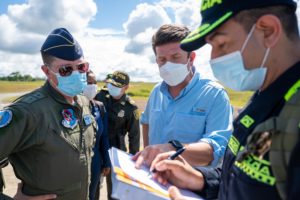
Diálogo: You said that “organized armed groups [GAOs] are clashing for criminal revenues in Venezuela with the connivance and support of the Bolivarian Armed Forces to get them out of there and take away criminal and narcotrafficking activities that they have on the other side.” What actions is the Public Force carrying out to stop the GAOs?
Minister Molano: All ELN leaders are in Venezuela and Cuba, as well as important FARC dissident groups, since the Nicolás Maduro regime protects these terrorist groups. There, they clash over criminal lines and these clashes lead to terrorist and violent acts in Colombia. We’ve seen it in Arauca, in the attack on President Duque in Norte de Santander, when they attacked his helicopter, including a military installation, such as the Thirty Brigade, where there was a U.S. consultant present. We’ve dismantled some organizations and their leaders, such as Los Caparros, Los Pelusos, and Los Puntilleros, and we have the case of alias Otoniel, who was captured and is in the process of being extradited to the United States, and the case of alias Fabián. We are working in the two border zones with the Norte de Santander Specific Joint Command plan and the intervention plan in Arauca, which seek to stop these groups from entering Colombia to commit criminal acts, protect the civilian population, and [carry out] an offensive to dismantle FARC dissident groups and ELN structures.
Diálogo: The Ministry of Defense (Mindefensa, in Spanish) presented the report Contribution to the Truth: In the Context of the Public Force for Historical Memory. What is the importance of this publication and what results do you hope to obtain?
Minister Molano: After the peace agreement signed in Havana [23 June 2016], Colombia entered into a transitional justice process that has certain bodies, such as the Special Jurisdiction for Peace and the Truth Commission, in order to clarify the truth, so that there would be a judicial process, and no impunity for those who committed crimes against humanity and human rights violations. This report is historic because it’s the first time that the Public Force presents its contribution to the truth; it showed that it has always acted under strict adherence to the law and human rights, and that it was the victim of a systematic attack in order to destroy it, especially by those who were the leaders of the FARC, which left 403,532 victims, who were subjected to torture, kidnapping, and landmines, among others. For this reason, President Duque asked the Special Jurisdiction for Peace to open a macro case against these members of the FARC who committed war crimes against the security forces.
Diálogo: What are the results of the Artemisa Campaign on the issue of environmental crimes and deforestation?
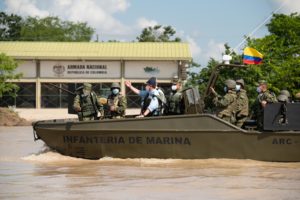
Minister Molano: For the first time, President Duque, in his development plan, stipulated that water and forests are strategic assets of the nation, which must be protected by the security forces. In Colombia, some 200,000 hectares are deforested every year due to illegal cattle ranching, narcotrafficking, or the extensive and illegal use of timber. Our goal is to reduce deforestation by 50 percent by 2030. The campaign was presented to NATO to show that the Colombian Public Force is a pioneer in this task and that it seeks to protect the Colombian Amazon. The campaign has succeeded in capturing and destroying infrastructures that create deforestation. For example, we achieved a 30 percent reduction in deforestation in the Meta, Caquetá, and Guaviare departments in the first quarter of 2021. In fact, two of the most dangerous members of FARC dissident groups, alias Iván Mordisco and Gentil Duarte, were charged with ecocide crime, and we even drew up a list of the 17 most wanted people for this crime, 11 of whom have already turned themselves in to justice.
Diálogo: What technological innovations does the Colombian military industry have to offer?
Minister Molano: The Navy has Cotecmar, whose main technological innovation in 2021 was the development of 12 shallow draft boats, and it is developing the first oceanographic vessel. We have the Colombian Aeronautical Industry Corporation, which supports the capabilities of the Air Force with very important innovations such as the Coelum and Quimbaya unmanned aerial vehicles, and we have Indumil, which is our military industry that supports the Army’s weapons capabilities, and which recently designed the Córdoba pistol and the Santander rifle.
Diálogo: How is Mindefensa strengthening its capabilities in information operations to counteract disinformation and fake news that delegitimize the actions of the Public Force?
Minister Molano: We have the Democracy 2022 Plan to guarantee free and safe elections for Colombians in March for Congress and May for the presidential elections. One component is cybersecurity and cyberdefense, which is handled internally at Mindefensa; we have a special cybersecurity command, and Police cyber command. From that we have sought to strengthen technological capabilities, the skills of military personnel in this field, and the capabilities to protect ourselves against attacks that can be made both by a virus or through denial-of-service, as well as information or disinformation campaigns — and in the face of these actions we have the support of SOUTHCOM.

